- Advert rates


If You Can Sail In Nigeria, You Can Sail Anywhere In The World, Says Lagos Yatch Club Commodore
…How Lagos Yatch Club Has Survived For 90 Years

…Why Many Nigerians Shy Away from Sailing
This year, the legendary Lagos Yatch Club, will be 90 years old. In an exclusive interview with Transport Day, the Commodore of the club, John Shidiak, spoke on its activities over the years and projections for the year amongst other issues. By Frank Kintum
Position As Commodore
Previously I was the Rear Commodore for five years. You know we have annual elections, members elect other members to represent them, so the term for Commodore is one year, but you can stand for re-election.
There is no term limit, as long as you are willing to. You know, it’s a non paid position; it is like a second job in many ways. How much time you can dedicate, if you are willing and if the membership keeps voting for you.
I see you have a membership strength of 300?
Yeah, more or less 300 families of various nationalities. These days, the single largest nationality is Nigeria. It is not always the case, but more and more Nigerians are interested in the water and are willing to do the minimum requirement that it takes to be a member of the Yacht Club. We are a sailing organisation; it’s all about sailing yachts. So, racing and sailing of Yachts which are non-motorised boats. We only use wind power to move our boats. To be a member of the club, you have to sail. We don’t have any social membership; you have to be a sailor if you want to be a member. There are minimum sailing requirements, i.e. you have to do a certain number of sails within some months of joining and then continuously over a certain period of time to show your commitment to sailing.
Because obviously, we have a very nice environment as well, which a lot of people like to enjoy, but the key purpose of the club is the sailing aspect.
Next year, your club turns 90. What are the plans, in terms ?
90 is a big milestone, obviously. The club was founded in October 1932. So, in October 2022, we will be celebrating our 90th year. The COVID has obviously been a major disruption to a lot of planning and to a lot of these big events. We have tried to plan a lot of things in the last couple of years which, unfortunately, have had to be cancelled on short notice.
One of the main ones, for example, is that we have a very big event called Sail around the world, which is a social event, where we have food and drink stands from different countries of the world and music, and it goes on late.
Usually, we attract around a thousand people to this event. We haven’t been able to have it for the last two years because of COVID 19. So, it is difficult to plan, but typically, we will have a week-long celebration. We will have events, we will have a big party, our anniversary dinner will hold, and we will have sailing and racing events around the milestone. So, probably a special race and over that week, we will do a number of different events and functions to celebrate the club’s 90th year.
We have plans, and I will share one with you. We have books on the history of the club that have been published over the years, usually coinciding with some of the milestones. The major ones were done for the 50th and the 75th anniversary. We were thinking of doing an updated one for the 90th. I am not sure if we are going to be able to do that at this point because the person that was handling the project had to leave Nigeria on short notice. It might not happen, but we have already compiled a lot of things that would go into the next edition of the book when we do decide to publish.
Some interesting things about the club-we were founded, like I said, in 1932. As you realise, 1932 predates the formation of Nigeria as an independent country.
One of the interesting things about this club, unlike all the other clubs in Nigeria and in many other African countries, is that when this club was founded, it was open to all people. So, even indigenes and Africans were able to join the Lagos Yacht club, assuming that they were able to fulfil the requirements. So, unlike others that discriminated and that were only for expatriates, or were only for Brits, this club from the very beginning always open to everyone, as long as you fulfilled the sailing requirements.
The sailing requirements remains till today; it is a barrier on its own. Many people have learnt how to sail at the club, and of course, there are a lot of people that come with sailing experience and are immediately attracted to this place because in their home countries or wherever they schooled, they learnt how to sail and want to continue but most of us, myself included, learnt how to sail here at the Lagos Yacht Club. It is a lifelong skill that you can take with you, and you can sail anywhere in the world.
Do you have instructors?
It is something that we are working on, to have formal instructors and a training program. We have informal instructors. So, basically, we have a very close association with the Navy Sailing Club. As far as we know, we are the two proper sailing clubs left in Nigeria. There used to be others around the country, but today, we are the only ones left that are active. We have Navy sailors that regularly participate in our activities and are working with us to provide basic introductory sailing lessons to new members.
A lot of people then learn on the water with other members. A lot of our members actually give up their time, up early in the morning before the race starts. Some of these Navy sailors have represented Nigeria at different levels, in different international competitions. We sail as a club; we race every Saturday.
Every single Saturday, we have a race. Some races are big races, like the one that was covered in your paper, some are just club races. Every single Saturday, if there is wind, we are sailing, and fortunately, it means that in Lagos, at least most Saturdays, we are sailing. We are working on a long term plan to have a formal training program and training school.
What time do you sail?
Typically, the race starts around 2 pm or 2:30 pm, and that is because usually, the wind picks up in the early afternoon towards the late afternoon. The wind gets impressively stronger during the day. Usually, it is quite calm in the morning, and the wind improves as the day goes on. The best time is around 5 O’clock , but obviously, you have to start early.
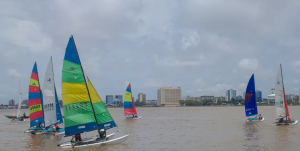
What challenges does the club normally face?
Run by members for members. Obviously, We have some full-time staff that run a lot of the operations of the club, but the management of the club is handled by a main committee of 9 people, who are all volunteer members, each one overseeing a department in the club.
We have two subcommittees; a sailing committee which is headed by the Vice Commodore and handles all the Sailing related activities, and a House committee which is headed by the Rear Commodore, which was my former position, which oversees all the non-sailing activities; social events, our kitchen, our bar, properties, our staff etc. and obviously, because it is voluntary, everyone that is on this committee also has another job that pays them outside of the Lagos yacht club, and they dedicate as much time as they can to the management of the club.
Being dependent on volunteers makes everything a little bit more longer, and it is a little bit more time for a project to become a reality.
The other limitation is that because we are a members club, it is open to only members and their guests, so our main revenue are the membership subscription that we receive from our members and whatever is spent by members in the club.
So we are limited. We are not open to the public, so that also limits what we can generate as revenue. We are reliant on what members spend and sponsorships that we receive from various organisations, who either sponsor a race or sponsor an event or are associated with the club, one way or the other.
I can see you have maintained a long-standing relationship with Coca-Cola
Coca-Cola is one of our very big partners, they are not the only ones, but of course, we have a very long relationship with them. Every year, they throw a very big race at the club, the date varies, it is not always at the same time of the year. This year it was, I can’t remember exactly, I have to check when it was, but I think it was in September we had the race. They usually throw a very big event; it was very well attended. They do a regatta, which is three mini races on the same day, the winner of which gets a trophy.
Coca-Cola is one, Nigerian breweries is another that we work with and also have sponsored us very generously over the years and most recently we did have the Governor’s Cup and the Governor’s Cup was sponsored by MSC, you know Mediterranean shipping company and Tin can island Container Terminal, and I think those are people that are in your industry, and we have a lot of other complaints that sponsor us, they are usually associated with a member but not necessary.
What international affiliations does the club have?
We are a member of the RYC, which is the Royal Yachting Association, it’s like the British sailing association, and then we have different types of boats that we sail, which are international standard boats. The main two are the Lightning and the Hobbie Cats, and our fleet here belongs to the International Federation, so either the International Lightning Federation or the International Hobbie Fleets Association.
We have the third class of boats, which is called the tarpon, which is the wooden version of the Lightning boats. The tarpon is made in Nigeria. Basically, all of them date to the mid-1930s, and they have been refurbished obviously over the years because it is wood. Some of them have gone through major refurbishments, but as boats themselves, they have a legacy since the 1930s.
Do you still have boat builders here?
We do, so we have an in-house carpenter and fibre glass person who help keep the boats in shape. You know, with boats being on the water, there’s always something that needs to be repaired, something here, something there. Especially if you have a wooden boat, those ones require a lot more attention than the others. It’s coming up to now to six, seven years now that the tarpon fleet was majorly depleted and having been a bit kind of abandoned and one member, basically with the help of the carpenter, rebuilt the fleet over a number of years. I think two, three years ago, we finally had nine of them back on the water.
As Commodore, what is your personal vision for the club before you leave this position?
You know it is a member-run club, so it’s not about personal vision, and at the end of the day, the vision and the strategy is guided by the membership. So it is not that I want to have the special project, and it must happen because I am the Commodore. At the end of the day, all decisions are made by the committee and power that is given to the committee is given by the membership, so we regularly consult with members to know the direction that the membership wants us to go, and then we propose a budget, our strategies which are then approved by the membership in terms of where we want the club to go.
Obviously, this is a sailing club, so the most important is what happens on the water, keeping the culture going and getting people on the water, and is not a matter of doing the minimum number of sailing requirements and then just sitting back and enjoying the beautiful space we have here.It’s about continuing to sail and getting into the culture of sailing.
So I will say for me personally, what I would like to see is regarding this training school that I have mentioned because this will guarantee the future generation. Historically, we have always had Nigerians, but it’s always been a minority of the membership, and that, in my opinion, is due to too many reasons, and one is that many Nigerians, unfortunately, can’t swim, so they have a fear of the water, so when you tell them I’ll put you on a boat that doesn’t even have an engine, they start to go “oh wait, there’s no engine so how do I go? Only the wind. So obviously, there is that aspect.
Obviously, it is improving, this new generation, most people can swim, so there’s less of that fear, and the other thing is that Saturday is our main day and as you know Saturdays are very often a very busy day in Nigerian society. It is when you have a lot of social events.
I think family and social pressures means that in the past, it was difficult to attract Nigerians over a long period of time. Some people come, and they will be a member for some time, and then they will get married, and they will have other responsibilities etc.
We are seeing more and more people buying into the culture and giving as much time, and this is why involving the next generation, making sure that children are also involved. If this is something that I, as a father, can do with my child, and there is something here that can help to bring my child to the water, then it becomes a family event, not just one person event.
So we are very family-oriented, and this is something we need to continue to be, and we have a playpen here, which is reserved for the children. We are trying to get a training program geared towards children; our memberships are family memberships, so they include the spouse and the children automatically for no extra fee. So having a training school with proper training instructors would help to continue that for next generations and will help young Nigerians start very early then it becomes an addiction, like any other sport that you start when you’re very young. It is a passion and a love that will take your whole life, and you will never be able to get away from the water.
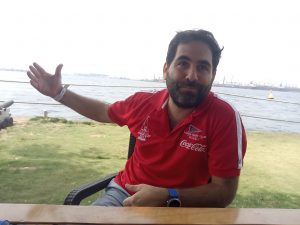
Have you thought of competitive yachting, the club discussing with the Sports Council?
I can’t answer that specifically. I know that during my time, we have never had any conversation with the sports council, but I can’t tell you that it has never been done before.
I know you know that there is a Yacht, Canoe and Rowing federation that was established less than ten years ago, and I know there was a lot of communication and some relationship building that was done there. It’s something that we are trying to re-establish.
Other than the Navy Sailing Club, there’s no other sailing club.
So it’s not like somebody has a boat in his house and can come and join, or there’s a school or university that has its own sailing academy that can come and join us. In the past, there were a few different sailing clubs around Nigeria and the records I have seen; there used to be in Port Harcourt, there used to be in Jos, on the lake, there used to be even in Kano on the lake.
So there were sailing clubs a little bit everywhere; unfortunately, a lot of them have gone away. So when we do have a competition, the only people from within Nigeria that we can invite and we do are the Navy Sailing Club.
In the past, we have had the Sailing club in Ghana come down, and we have been to them. Every year we have had national championships for each different class of boats, the winner is the Nigerian national champion, and this person can go represent Nigeria at the International Competitions; the international lightning competition, the international hobbie class association. We have had a number of members go and represent Nigeria, flying the Nigerian flag at these different events.
We have one very famous event here, called the Badagry race, which is held every year, we had it this past November. So, it is a race to Badagry, but Badagry is pretty far, so it is not something you can do on the same day. It’s an overnight race, so they set out from here usually around 11am on Saturday, and they go, and it takes them about seven, maybe eight hours to get to Badagry, and at some point, they will sleep on the boat and then come back on the next day.
In most races, the first one to come back is the winner. In this race, it’s not the first one to come back, each one basically does a log of how much time he has been racing, so when you stop the boat for more than 1 hour, you can disregard that time. So the winner is usually the person that is the most strategic and most patient and is waiting for the tides to turn and for the wind to pick up etc.
There is a famous race in Tanzania that takes place every year, and we have people that go there. In terms of relationships, we also have reciprocity agreements with different sailing clubs around the world and around Africa. Where members of this club can go if they happen to be visiting that country, can enter the club as if they were members and those guys, if they are ever in Lagos, can come here, showing their card from their own place and they can walk in. We got a variety of clubs from around the world that we have this reciprocity relationship.
You have never had any security challenges?
Nigeria has changed a lot in the last 30 years ago, the club has been here for 90 years, but things have obviously changed. We have a very exposed waterfront, obviously, but we have the Navy in many places around us, and we have got the Army as our neighbours. It is a very strategic and visible location.
On the water, to be honest, up to now, these areas have been covered and well-protected, whether it is Marine Police or the Navy. You will see Marine Police here on the water because this is the main entrance to the Lagos harbour, so they have to be monitoring who is coming in, who is going out. So, there’s always a pretty large security presence, one of our main naval dockyard is right there, the Western naval command is right there.
The Navy, the Army have bases at Tarkwa bay. So, fortunately, for now, in these places, people have not ventured to try and do anything in these areas. Also, we sail during the day in full visibility.
When we are sailing, the harbour is working because ships are coming in, ships going out, which we also have to manage because the priority obviously is the shipping. It is not our racing or sailing that is the priority; at the end of the day, we sail at the pleasure of the Harbour Master of the Lagos Ports.
Hopefully, it stays that way, whether it is the Navy or the Marine Police or whoever is around can keep doing the good job that they are doing.
Whenever foreign navy vessels come to Nigeria visiting the Navy or patrolling the areas, we invite them, and they come. Very often, they don’t get the opportunity to go off their ships when they are visiting various places. This is one of the places they usually come to visit. If you see the wall, we have a lot of plaques from different ships that have visited over the years.
The most recent one was in September or October last year (2020). A British Navy ship was in town; they were just here doing training activities with the Nigerian Navy. We hosted them one night, and I was also invited to their ship along with the Navy people and other dignitaries.
The ownership of boats here, is it individual or club owned?
So we have both. We have boats that are owned by the club, most boats are owned by individuals, but very few boats ever leave the club. I, as an individual today, have a boat. If I was to leave Nigeria, most likely, I would sell that boat to another member within the club. Very few people take their boat away, it happens once in a while, but most people don’t.
Every few years, we import some new boats which are usually purchased by some different members. So, yes, most of the boats stay in the club community.
Can you tell me a little about yourself?
Sure, I am fifth generation Nigerian. My parents were both born here, so I grew up here in Lagos. I travelled, but I am back now. I work for a company called Bristol Scientific, we are in the laboratory supply chain, working with all sorts of laboratory, whether it is medical, quality control, factories, research and universities etc. So anything called laboratory is basically our space. I am the Managing Director of Bristol Scientific, which is my full-time job. This is my second job, even though it doesn’t pay me.
I am married with young children. My three and a half year old son sails, my daughter is not too interested, but my son is interested; he enjoys it. He is not sailing competitively; he is still a bit young.
So, yeah, in terms of me, this is my main hubby; obviously, it takes a lot of my free time, but we are giving back something that is 90 years old. What I like to say is that 90 years ago, there were people sitting here like you and me, doing this exact thing, in this exact spot, sailing in the exact same water, undisturbed in the same way for 90 years and you know, these are sailing boats, so they haven’t changed so dramatically in the last 90 years. It’s not like cars or motorboats that have improved; they are much faster.
Nigeria is one of the best places in the world to sail, and why I say that is because it is one of the only places in the world where you can sail every single day of the year.
In most places, sometimes it is too cold, sometimes the weather is not good, etcetera. Here, literally, you can sail every single day of the year and then here, we have a lot of different bodies of water where you can sail. You know, in most places you are limited to one type of sailing. Here, you can go offshore, out into the ocean and sail there, and you can go up the creek.
So there are different types of sailing, you get a lot of different currents here, it creates a lot of different sailing environment for people to enjoy.
This means if you learn how to sail in Lagos, there is very little or no place that you can go, and you won’t know how to sail there, and we are very fortunate. We look forward to more people embracing this passion for sailing and understanding the culture of sailing because it is a culture. Wherever you go in the world, you meet sailors, and they talk about the same things; they enjoy the same things.
RELATED ARTICLES MORE FROM AUTHOR
Nsib, nigerian navy collaborate for enhanced maritime safety, icrc gives green light to $3.5 billion bakassi deep seaport construction, lekki port: fg authorises dangote to construct n158 billion port service lanes to expressway, nigeria to mark world maritime day, thursday, september 26, why i am not interested in ibom deepsea port-akwa ibom governor, ministry, nimasa commit to promote industry partnerships – oyetola.

Nigeria Passport Global Ranking To Improve With Recent ICAO PKD, PKI...
Reps ask fg to allow marketers lift petrol directly from dangote..., kano government resorts to 24-hour work schedule to complete construction of....
You are using an outdated browser. Please upgrade your browser .
- Sign in Facebook Google or Forgot password? Sign in Sign up

- Lagos Yacht Club, Lagos, Nigeria
Sailing / Yacht Club
Lagos Yacht Club
View on map
John SHIDIAK, Commodore
Simon COKER, Honorary Secretary
Contact Person
Adedayo IDOWU, Rear Commodore
Lagos Harbour

Weekly regatta for: - Laser - Lightnings - HobieCat 16 Annual national championship - Lightnings - HobieCat 16 -Laser -Osprey Not on the water facilities include: - Restaurant - Bar - Children playground - Beach
Founded Year
Founded in 1932, Lagos Yacht Club (LYC) is located in one of the best property in Lagos Island, just across the bridge leading to Victoria Island, making the view from LYC picturesque. You can watch the ships sail to and from the harbor, watch the Yacht Club races or even be a part of one
Magazine Point
+2348177777038
Contact Person Phone
[email protected]
Contact Person Email
http://lagosyc.org
- [email protected]
- +234 817 777 7038

- TYPES OF BOATS

Let's discover our History
The Lagos Yacht Club, located at Magazine Point, near the Army Officers’ Mess on the beautiful Island of Lagos in Nigeria, was founded in 1932. The Club is located right across Independence Bridge leading to Victoria Island. Magazine Point was an ideal location for a sailing club not only because of its picturesque scenery but also for its convenient location.

To promote, encourage and participate in the sailing and racing of sailing boats
To be the center of excellence for sailing in West Africa, fostering a vibrant community of sailors and leading the way in competitive and recreational sailing.
Our History
Sailing as a sport and a pastime was introduced to Nigeria in Lagos around the turn of the century. The earliest photographs dated 1907, show enthusiasts standing by their gaff rigged boats, clad in long trousers and jackets and wearing the obligatory topees, on the very spot where the Club now stands. The Club archives contain photographs of boats, housed in covered sheds and captioned ‘Lagos Sailing Club 1907’ but there are no proper records until October 1931.
The first meeting of the Lagos Yacht Club was held on 4 October 1932 at the original Ikoyi Club. A committee was formed and the fee was set for the annual subscription. The first annual general meeting was held on 13 October 1932 and the officers of the club were appointed. The first official Regatta was held on 29th October and on 31st October the first Sailing Committee was appointed and numbers L1-L9 were allotted to the boats.
Membership of the Club was soon boosted by a surprising and very welcome number of enthusiasts from the Railway. Boats were manhandled over the sand beach on rollers to a bamboo and thatch shelter. It was some more years before the club was able to finance a concrete hard with hauling gear and some sort of Club House.
Over the years the Club has been fortunate enough to have good leaders and careful managers. Initially, only the committees were the Main Committee and the Sailing Committee. As the Club Property became more substantial and facilities provided were expanded a House Committee was formed in June 1968.
The basic elements of LYC Saturdays have not changed since 1932, the harbour, the sun, the wind, the rush and bustle of crews getting boats into the water. The Club remains a stable feature in the lives of its members, it offers sport, relaxation and a place to meet and make friends outside the confines of employment. We all continue to be grateful to those members throughout the years who have watched over and developed the Club which we enjoy today.
Sailing and yacht racing is an exhilarating experience but like most sports, you need to know what you’re doing. If you have the ‘need for speed’ and water is your element, then the Lagos Yacht Club is the place for you.
The Main Committee
Dynamic and effective committees have ensured the Lagos Yacht Club continues to be the leading members’ club in Nigeria.
Our committees make decisions on behalf of the Club and ensure the Sailing and non-Sailing activities of the Club run smoothly.
The Main Committee, led by the Commodore and Flag Officers (Vice Commodore and Rear Commodore) meet at least once each month and receive reports from the Sailing and House committees who also meet at regular intervals. Its purpose is to serve the Club Members.
Committee members are elected every year from the Members of the Club at the Annual General Meeting which provides a forum for the expression of membership views.
The current committee members elected to serve for 2023-2024 are

John Shidiak

Daniel Watts
VICE COMMODORE

Phaethon Payiatis
REAR COMMODORE

Simon Coker
HONORARY SECRETARY
HONORARY TREASURER
Wolter Wielenga
SAILING SECRETARY
Marjolaine Sebillet
MEMBERSHIP SECRETARY
Chris Evans
BERTHING MASTER
CLUB ENGINEER
Daniele Paradisi
CATERING MEMBER
Jean Philippe Hazoume
BAR SECRETARY
Xavier Cadorel
SOCIAL SECRETARY
Martin Trachsel
SAFETY MEMBER
TARKWA MEMBER
George Chagoury
OGOGORO MEMBER
Aurore Craenhals
PLAYPEN MEMBER
Paula Campbell
CREWING MEMBER
Bobby Bryan
HOUSE MEMBER

- A: Magazine Point Near Army Officers Mess Lagos, Nigeria
- E: [email protected]
- P: +234 817 777 7038
- Privacy Policy
- Cookie Policy
Copyright © 2024 LAGOS YACHT CLUB All rights reserved – Website Design LIKE WEB DESIGN SRL

- AMERICA'S CUP
- CLASSIFIEDS
- NEWSLETTERS
- SUBMIT NEWS

Top conditions expected for this week's GC32 Lagos Cup
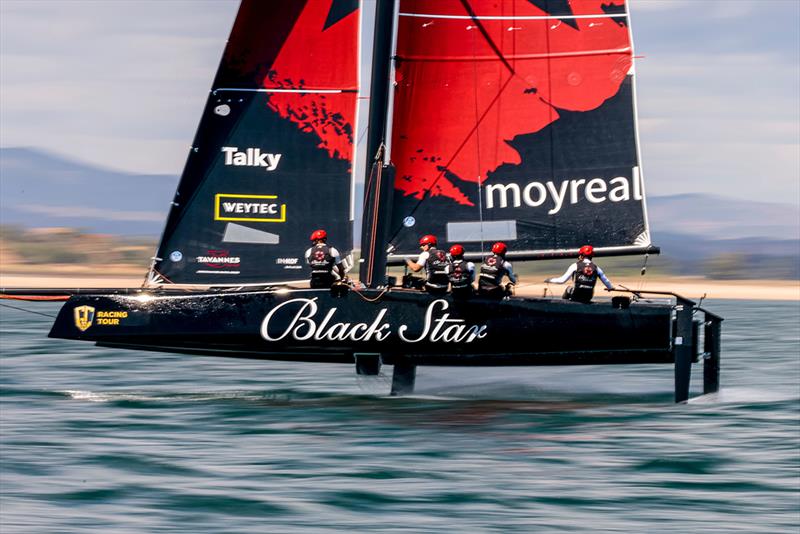
Related Articles
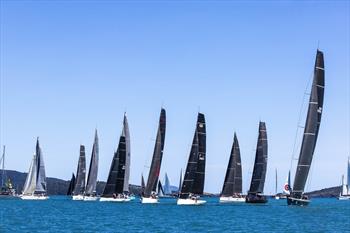
Everything You Need to Sail Around the World (by an expert)
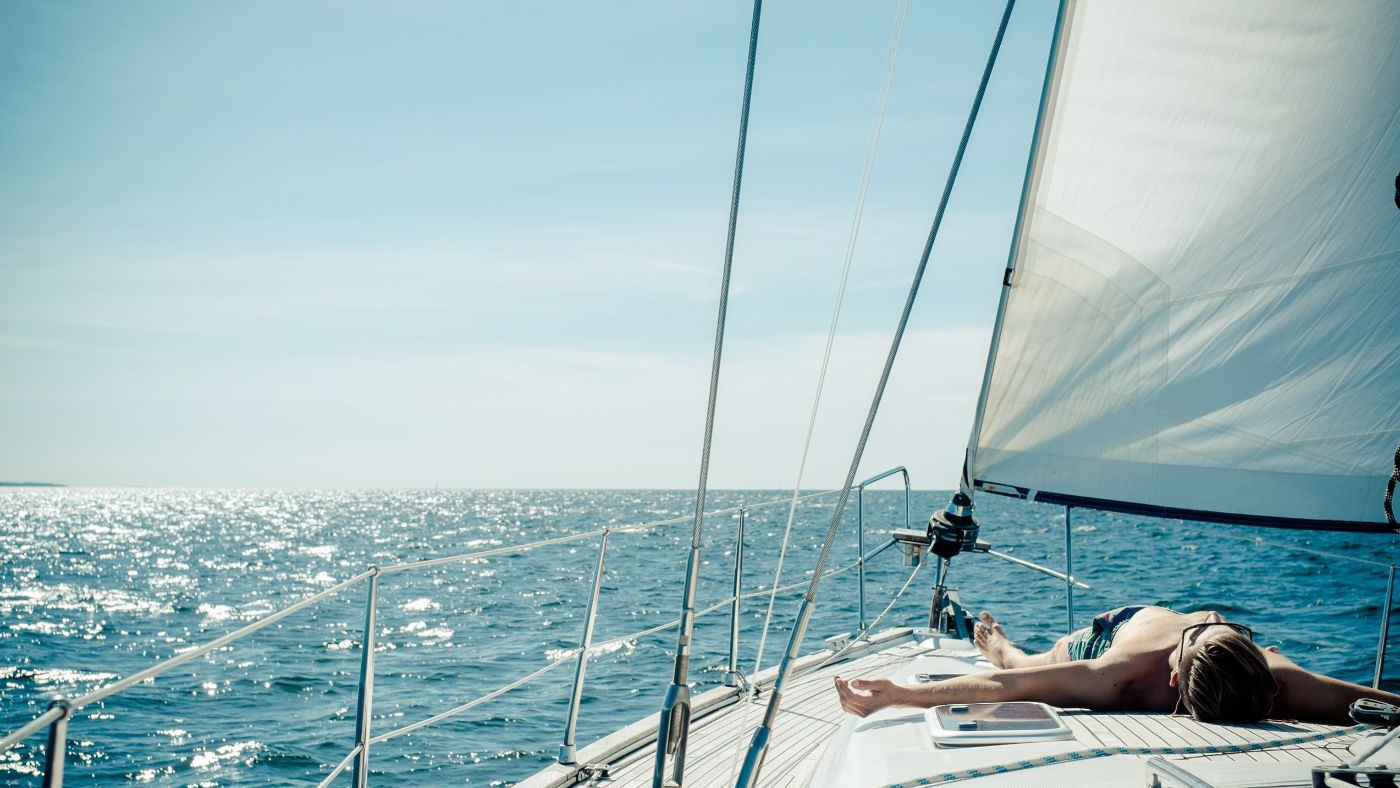
Wanting to sail around the world is a wonderful plan requires dozens of items and skills. For a clear overview, we have compiled a one-stop-shop article that will push you miles towards your goal. Here are the things necessary to successfully circle the globe on a sailboat - the tangible and the intangible ones.
What do you need to sail around the world? You will need a route, a bluewater sailboat, enough money, time, the necessary paperwork, and equipment (i.e. water maker, electricity generator, satellite phone, power-free autopilot). You'll also need proper safety training, mental and physical preparation, and you will need to be prepared to do plenty of research.
There are many items hidden under each of these categories, so let's have a closer look.
Everything you need to sail around the world:
A well-prepared route, a reliable bluewater sailboat, $500 - $1,000 per month per person, travel documents (passport and visas, boat registration, port clearance), cruising equipment recommended by other cruisers, the proper safety equipment, the appropriate safety training, proper preparation to prevent poor performance, time: between 1-3 years, the right mindset to handle mental demands, research of expected sailing situations.
This list is not detailed to the last windproof jacket and a high SPF cream. Such an article would be fifty times the length. Rather it is a wide, birdseye view of categories you need to think about and research so that you can build your checklist.
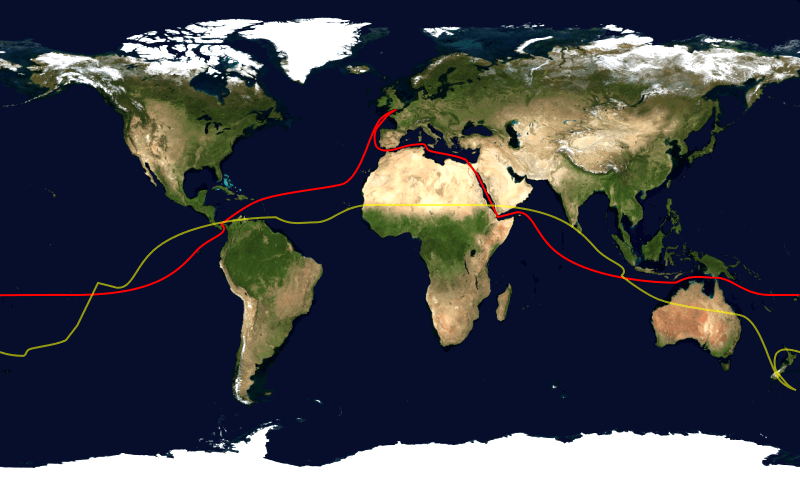
There are more ways to skin a cat, and there are more ways to sail around the world. Since each of those ways requires a different approach in terms of necessary skills, sailboat, equipment, provisions, time, and crew, the first step should be planning your route.
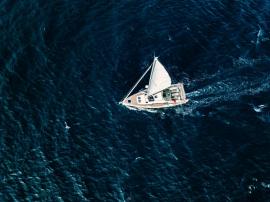
7 Best-Known Routes for Sailing Around the World (with Maps)
You don't need to be especially detailed, outlining every stop on a precisely defined route. I'm talking about a general idea of what you want from the journey because this will influence the items on the following list.
Are you looking to simply tick circumnavigation off your bucket list, wanting the most straightforward, fastest way? Is this more of a world traveler's dream, and you want to visit beautiful places along the way and don't mind making a few stops on the way, even if that extends the trip duration by months? Or do you perhaps have specific stops in mind?
Either way, you will want to know what your expected journey is. A quick look on a globe will instantly hint to many approaches. Various approaches will differ not only in the overall length, which impacts the time needed but also in the distance between the stops, impacting the provisioning system and how far from the warm equator you will be, which impacts the kind of clothing you will need.
The safest sailing route around the world uses the trade winds You want to stay as close to the equator as possible, but you also want to avoid the following 5 places if you can. We've listed the safest and fastest sailing routes for you. Also read: The Safest Sailing Routes Around the World (Which to Avoid)
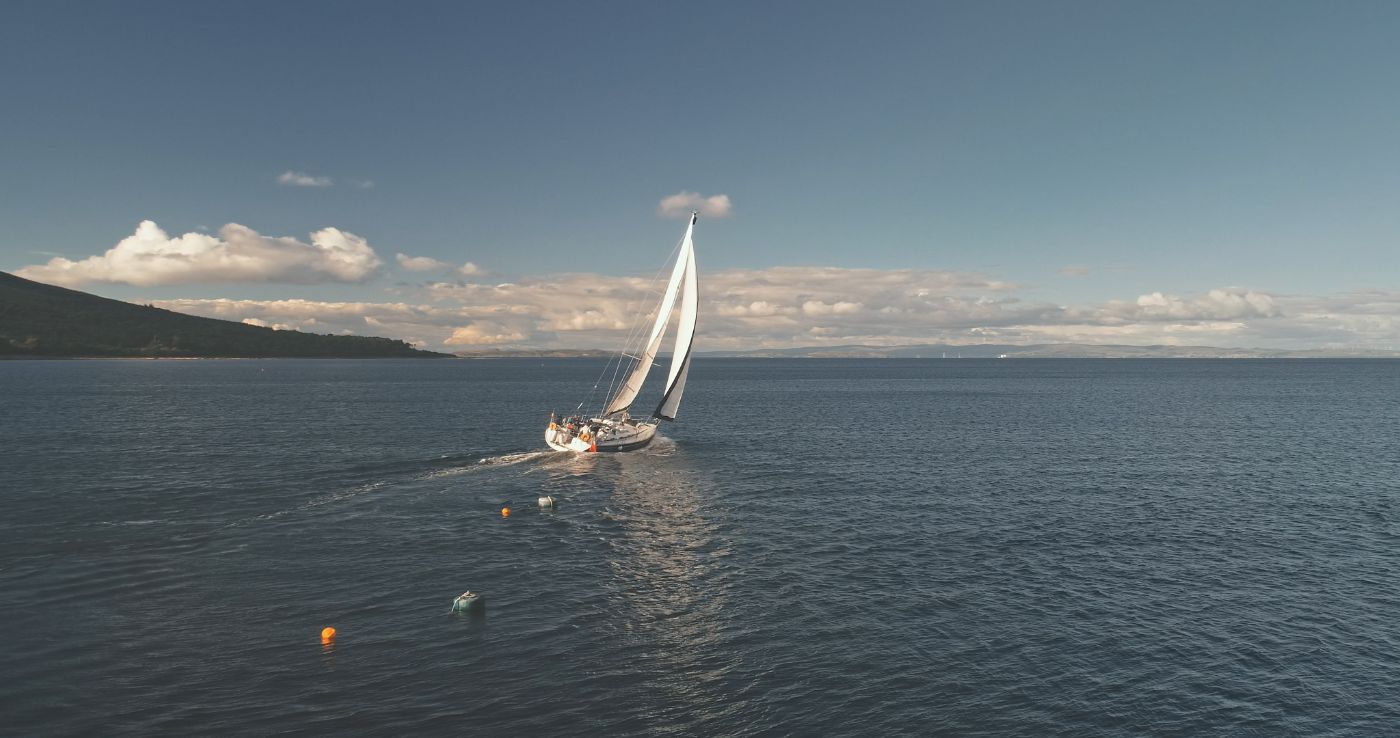
Let's get this out of the way first - you don't need a large boat to circumnavigate the world. Larger boats are comfier and faster, but technically not necessary. The smallest sailboat to circle the globe had around 21 feet. We have written many times about small boats that are great liveaboards, so it is possible. Your comfort level, partially dependent on how many people will go with you, is individual.
If you are in a money-saving mode, it pays off to get a smaller boat, but one in good condition, instead of a larger one requiring more maintenance.
But as mentioned before, since your route's character influences your needs greatly, if speed is what you are looking for, as well as long crossings without stops, requiring more spare parts and provisions, a bigger boat is what you will need.
Either way, it needs to be a boat with offshore capabilities. Not a weekend cruiser.
Many people think sailboats are super expensive We did the research, and it turns out you can get a capable bluewater sailboat for just $3,000 . However, it isn't for everyone. Here's the cheapest bluewater sailboat
The short answer is - prepare to typically pay around $500 - $1,000 per person per month when sailing with the sky being the limit, of course.
Here's a breakdown that will apply to you if you are a cost-efficient person:
Breakdown of cruising costs per month:
| Monthly Expense | Percentage | Amount |
|---|---|---|
| Food | 25% | $250 |
| Maintenance | 20% | $200 |
| Insurance | 15% | $150 |
| Cruising fees | 7% | $70 |
| Mooring fees | 6% | $60 |
| Satellite phone | 6% | $60 |
| Fuel | 5% | $50 |
| Discretionairy | 16% | $160 |
Roughly 25 percent of your budget will be for food . Eating out is not included.
Around 20 percent will be spent on maintenance (though this varies depending on the state you got your boat in). This means sail and rigging maintenance, yearly haul out and antifouling, electrical and winch malfunctions, engine spares, water filters, and so on.
Approximately 15 percent will be spent on insurance - unless you are against that whole concept.
About 7 percent will be spent on cruising fees , such as permits, visas, and check-in fees. Panama canal costs north of $1,000, and so does entering Ecuador. New Zealand, on the other hand, will set you back merely tens of dollars.
Around 6 percent will be needed for mooring fees , though only if you anchor whenever possible.
A similar amount will be needed for a basic satellite phone plan for communication and weather reports and various sim cards to connect to the internet, when possible.
Fuel varies, but 5 percent is not an unreasonable amount to expect to spend on it.
The rest will be spent on a range of expenses - various clothing, eating out, flashlight batteries, sunglasses you keep drowning, and all that jazz.
The percentages will vary from person to person, but they are not the most important part of the above breakdown - rather, it is the expense list since these are the things and items you will have to pay for, and thus you should know about them beforehand.
Just as before, the kind of trip you have in mind will determine many of the costs. Antifouling might not be needed if you are going at it non stop and are done within months. That $1,000 for the Panama canal won't be necessary if you venture around South America and the infamous Cape Horn. And venturing through Suez, Red Sea, and the Gulf of Aden will require extra security expenses.
And of course, if you are paying $1,000 monthly, the overall expenses will differ whether this is a three-year travel journey or you are doing a Vendée Globe style circumnavigation.
Sailboats are cheaper than you might think We've compared thousands of sailboat listing prices for four different budgets. There are a lot of costs involved with owning a sailboat. Learn everything there is to know about ownership costs with our comprehensive overview. Read all about sailboat ownership costs
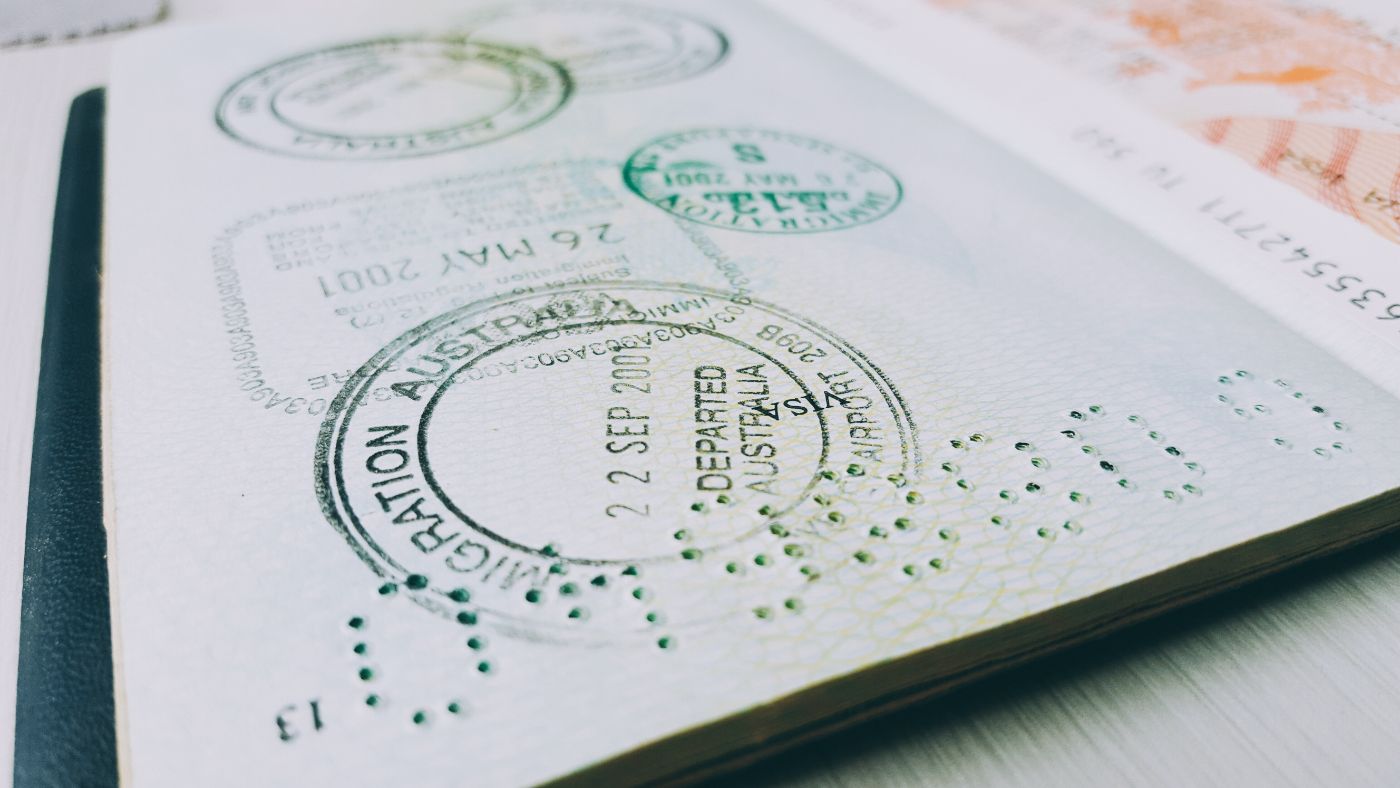
Boring? Yes. Necessary? Also yes. Except for those of you who will make the trip non-stop without visiting any country, you may need your passport and sometimes valid visas.
Then there is your boat registration and port clearance. Boat insurance policy is a must in some places, where they won't let you in without third party liability or personal liability.
Sometimes you will need your MMSI number and proof you have AIS capability. Having a few copies of passport-sized photos of the crew helps too - as well as plenty of photocopies of all documents. You will save yourself some running around, trying to find a copy machine.
Here are the licenses you'll need for sailing the world You'll need lots of documents for some places, and none for others. William sailed the world for 8 years and made an overview of all documents you'll need and the documents you can leave at home. Read all about international sailing licenses
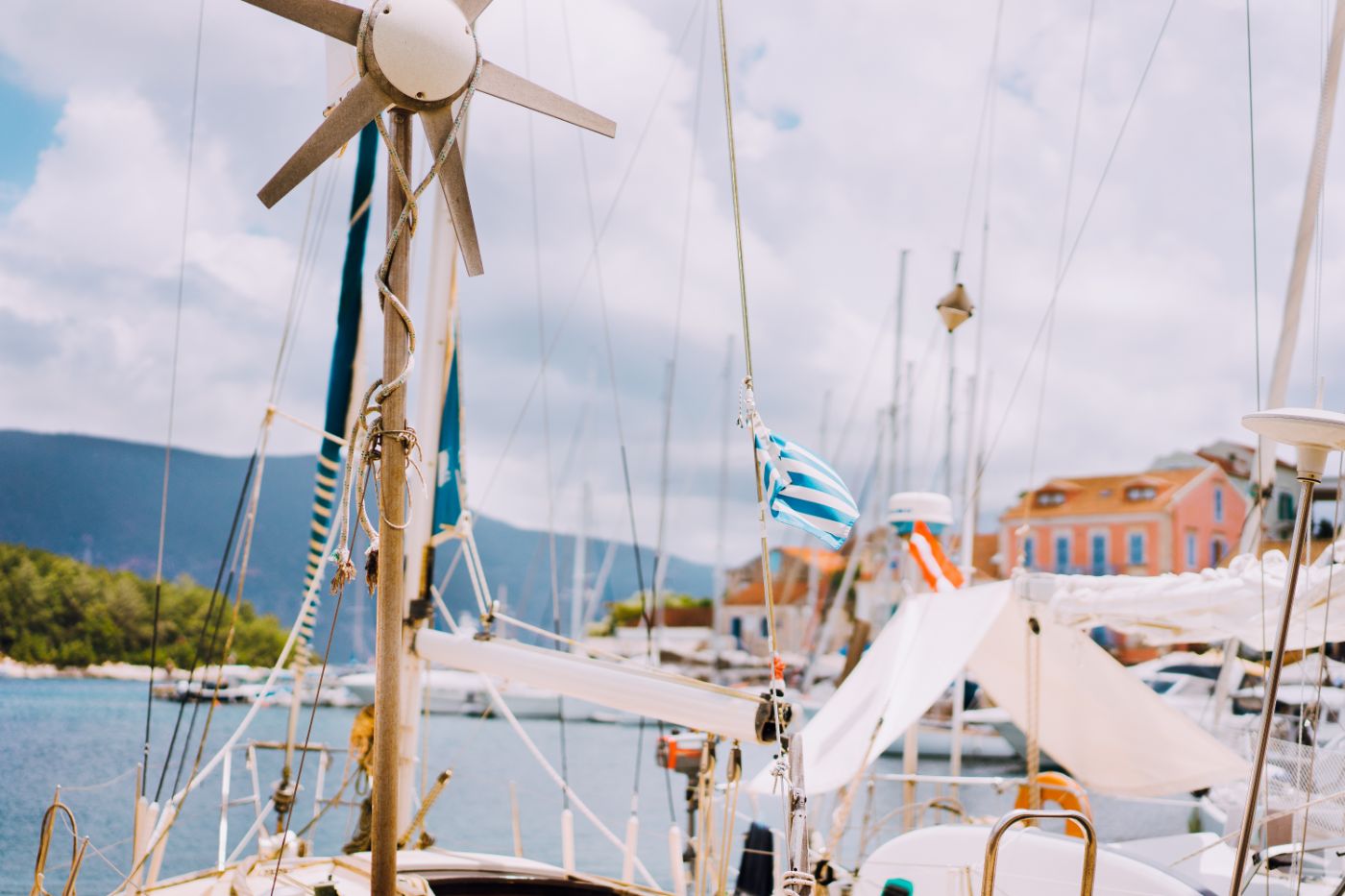
Your actual checklist will be a mile long, but here are several things worthy of extra mentioning. These items came from quite extensive research where numbers of circumnavigators, both racers, and cruisers, were asked to name items they found the most useful. Safe to say, they all named more or less the same set of things.
Now, unless you plan on staying so close to the shore most of the time that you might as well make the trip in a car, you will need plenty of water. Full tanks probably won't cut it. You will need to make your own, probably from seawater.

Electricity generator
The same applies to electricity. Whether you will choose a hydro generator, solar panels, or a wind turbine, you will quite probably need a way to generate some power.
Satellite Phone
Whether it is about safety concerns, or wanting to be able to stay in touch, this is a must. You shouldn't set sail without a reliable weather report. There are many options,, including satellite internet, thanks to which you will be able to be online wherever you are. If you are unsure where to start researching a solution for you, Iridium GO! is among popular choices.
And if Elon Musk's Starlink kicks off as promised, global satellite internet will be an affordable thing for anyone.
Good Bimini
If you are a holiday cruiser kind of person or if you usually sail in areas without much strong sunshine, this might not come to mind when compiling your checklist. But the ability to be in the shade while being on deck will prove crucial.
So make sure your bimini is solid, has a few good years ahead of it, and covers what it needs to, without the need for makeshift solutions consisting of hanging towels and clothes around you to protect you from the low, afternoon sun.
Downwind Sails
The value of good downwind sails that will propel you forward even in light winds is undeniable, though not always do they find themselves on a sailor's checklist. If you plan a long journey, you will appreciate them since conditions won't always be favorable.
Power-free Autopilot
Autopilots will save you lots of headaches when on long stretches, especially if you do things short-handed. But the classical ones use a lot of power. So look into solutions like Hydrovane, which will take a lot of work off your hands.
AIS Transponder
Not only is this a good thing to have for obvious reasons, but it is also mandatory in some areas and will save you money on certain insurance plans.
There are many sailboat cruising essentials There's lots more you'll need, and plenty you hadn't thought of if you're a first-time cruiser. We've listed them all for you. Read all about cruising essentials
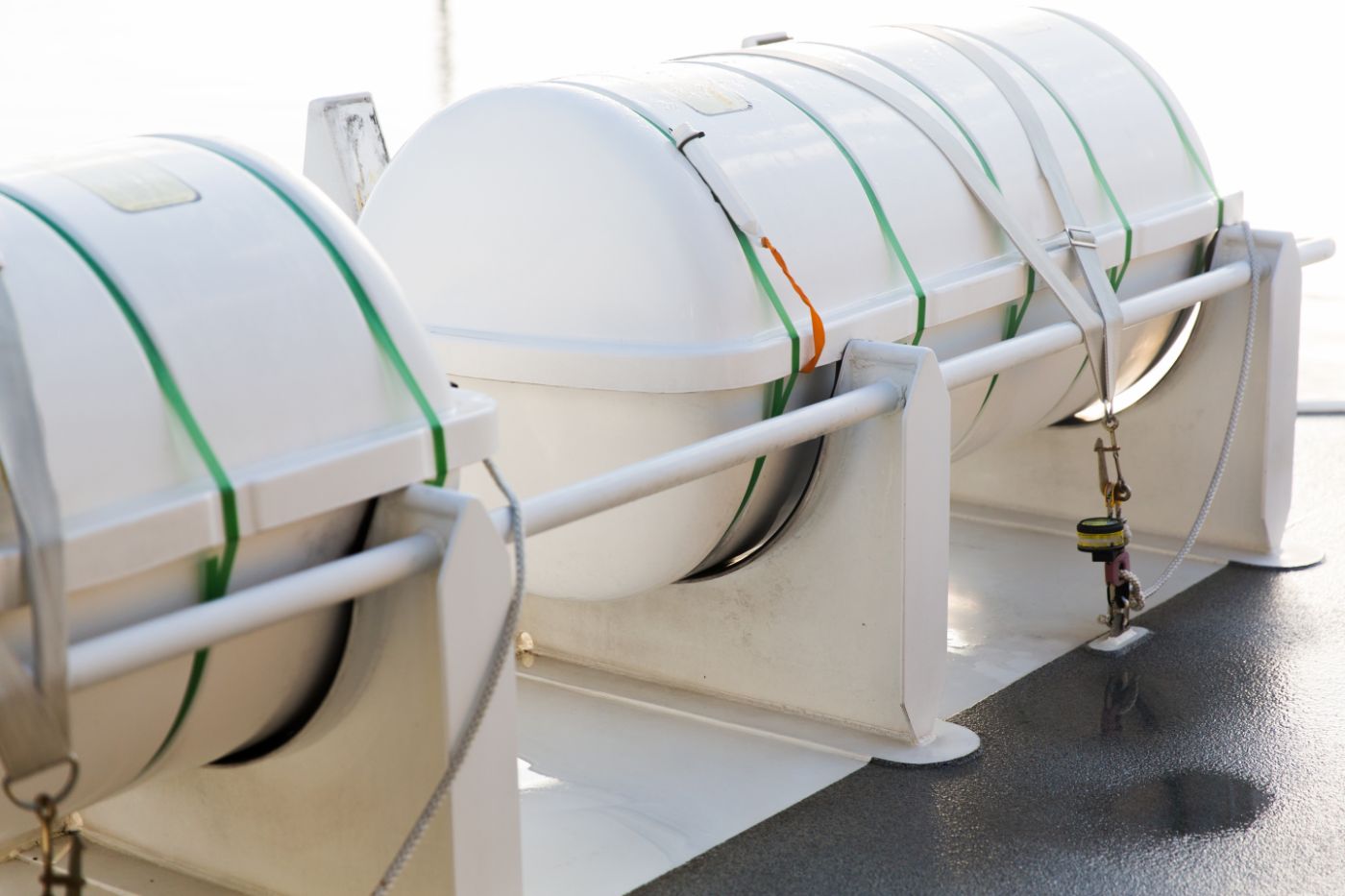
A liferaft, enough lifejackets, and harnesses. As for the liferaft, preferably one that isn't out of date - yes, that is a mishap way more common than you'd think. As for the lifejackets, preferably ones with a crotch strap and a sprayhood, as well as a light, reflective element, and a whistle. And as for the harnesses, preferably a three-point one. A grab bag with an EPIRB, basic survival items, and some provisions should be at the ready as well.
A well-stocked medical kit is a good idea too. Even something as simple as a plaster goes a long way when there is no place to buy it for thousands of miles around.
If you are unsure about what belongs in a solid safety kit checklist, consult, for instance, the ARC's safety equipment requirements - this event is meant for cruisers, not super experienced racers, so it lists everything you might need without supposing you will MacGyver your way out of any tricky engineering situation.
U.S. Coast Guart recommends this safety equipment We've created a full of the safety equipment required by the U.S. Coast Guard, which is a great starting point for beginning cruisers. Read all about safety equipment
If there is a screw on the boat, have the tool to unscrew it, no matter the shape. A power drill, spares, wires, lines, patches, glue, pliers, a knife, a hammer… go wild. These items aren't particularly costly, so make sure there is a toolbox on the boat with anything you can dream of putting in it.
Get a head-start by using our recommended tools You just need a couple of basic tools to be properly prepared. Over the years, we've recommended products that are well-priced but reliable. Check out our favorite tools
Offshore Sail Repair Kit
This should be in the above category, I suppose, but let that one belong to the boat, while this one tends to the sails. Of course, you should have some spare sails, but incremental wear and tear is an inevitable part of long term sailing, so be prepared to mend here and there.
Fishing Gear
For obvious reasons. I'm not saying you will find yourself stranded in the middle of the Pacific, with no food left, reliant only on what you fish out of the ocean, but if you want to save on food, have it as fresh as it comes and have a backup plan just in case, a good bit of line with some hooks and baits will come in handy.
To leave the tangible category, here's something many overlook and never need. But if it all hits the fan, you will wish you wouldn't have. In other words, it pays off to rehearse various emergency situations, using the equipment you would, including fully inflating your liferaft.
It may sound a bit boring, and yes, perhaps you won't need it (let's hope), but much is at stake when you do.
You can learn most for free from home There are lots of free or cheap online courses that will teach you the fundamentals. Check out our course recommendations
If there is a time when you want to take advantage of the ultra-organized, obsessive part of your brain, it is before you depart.
In other words, have a detailed preparation plan. Have a detailed journey plan with all the distances and entry prices and necessary documents in it. This should be done to such details as general grocery prices in various areas. Many sailors, after crossing the Atlantic, arrived in the Caribbean, cursing themselves for not stocking up on groceries back in the Azores because food in the Caribbean is so bloody expensive.
Make no mistake; this isn't really about money. If you don't mind paying extra, that's fine. But this is mostly about the mindset of a person that prepares well for all the little eventualities and has two back up plans for if XYZ happens.
The kind of a mindset that will have spare parts for everything, two copies of maps on paper, and the will to power through the logistics of it all.
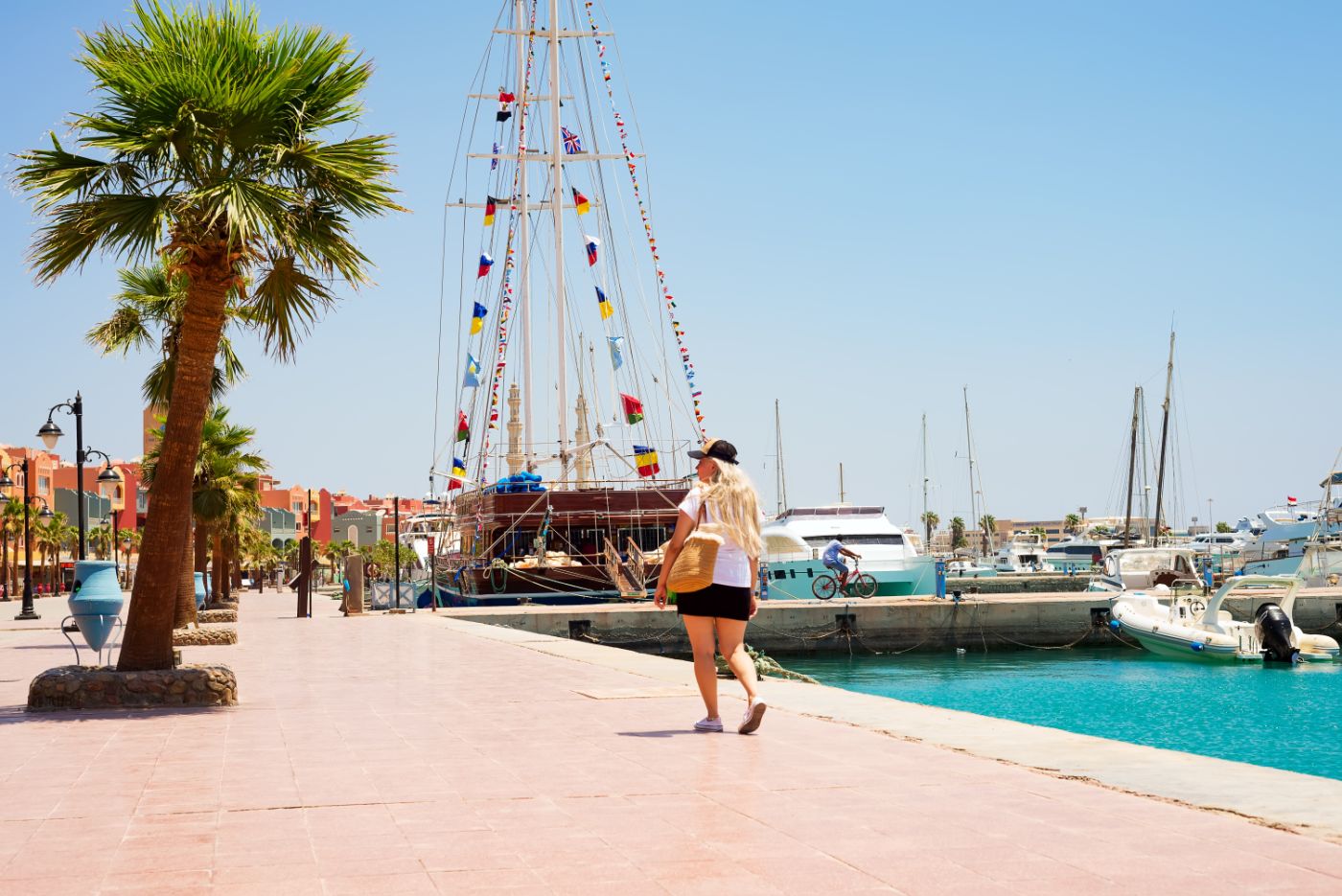
The Vendée globe racers do it in under three months, the world cruisers who are in a hurry in a bit over a year, but most take two years and up, to take advantage of good seasons and to get the most out of every location they visit.
You can sail the world in around 3.5 years How long it will take you depends on your goals. We've compared three sailing speeds to see how long it will take you . Find out how long it will take you
I'm not a fan of articles telling you how sailing is tough and why it probably isn't for you since only those belonging to the big boys club can enter. If circling the world on a sailboat is what you want, then circling the world on a sailboat is what you will get.
Nor do I like articles that speak of all the miseries you will have to endure, articles whose authors low key boast about how they don't have any issues enduring said agonies. They make sailing seem like something unattainable for the everyday man, an exclusive activity for those with warrior blood in their veins, which is just unnecessarily elitist.
That being said, know what you are getting into. Know what it means to sleep on a boat for months, know the limits (and perks) regarding comfort, using the bathroom, showering, preparing and eating food…
Also, know the physical and mental demands of operating a sailboat for months and know of its dangers.
Be aware of how you feel about spending lots and lots of time either alone or in the company of whomever you want to sail with.
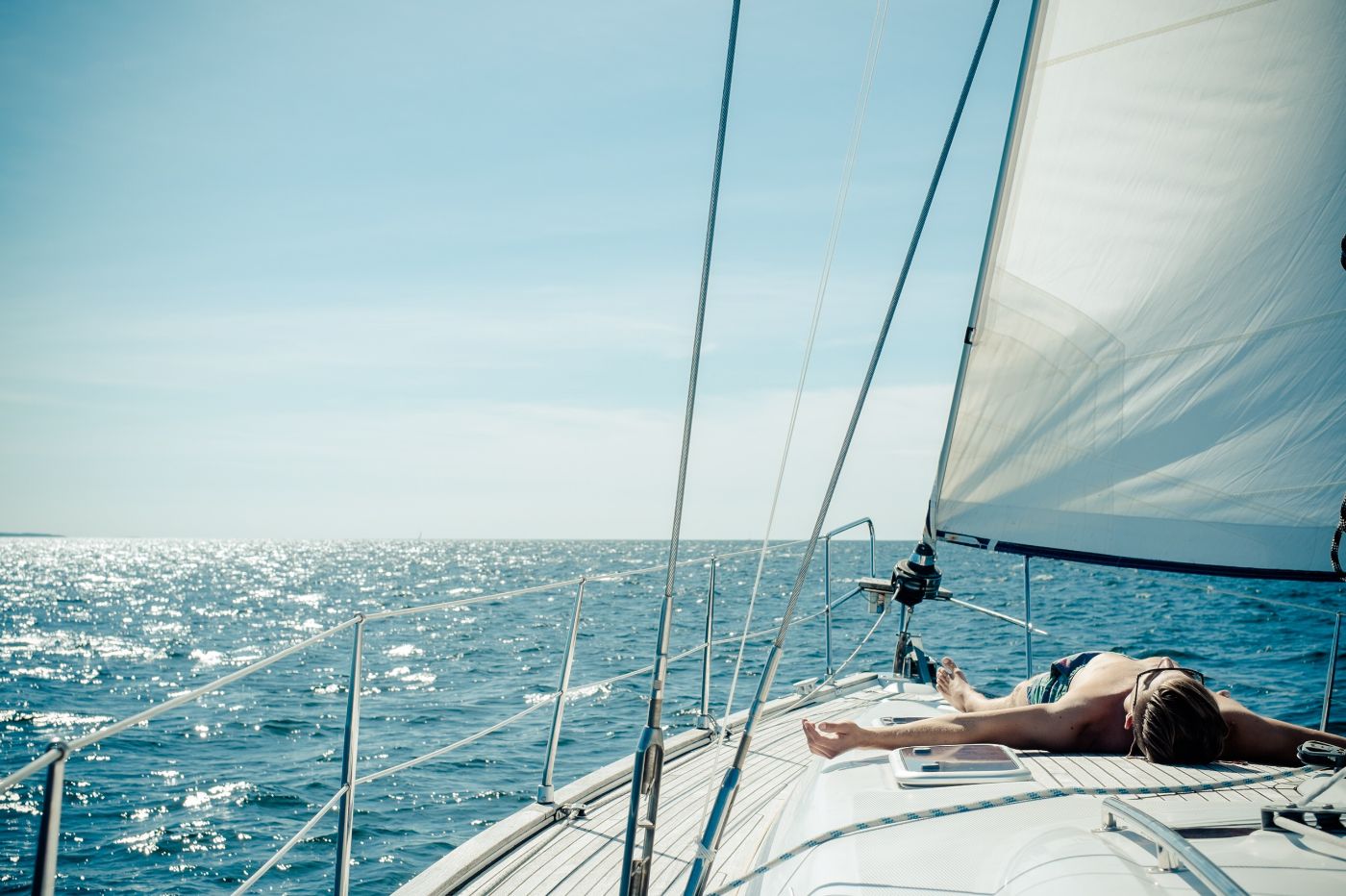
How to get there? A regatta in 50 degrees Fahrenheit, high winds, and bad weather is a great start. Getting aboard a sailboat as a crew member, ideally not an island hopper, but one aiming for longer stretches, is a great continuation. Reading blogs and watching vlogs from various sailors helps too, as it virtually introduces you to situations and ideas you might not have thought of.
If I was to decide on a single way to get into the mindset you need, it would be joining an ARC fleet for an Atlantic crossing. Not just for the sailing experience, but because their events are fantastically structured, and you will understand what a long journey means logistically.
It is very much possible to go around the world in a sailboat. Yes, it takes preparation and an adventurous mind, but in the end, it is nothing but a set of specific tangible and intangible parts that, if you have under control, you will likely succeed.
And since there are not many greater adventures available on Earth, what better thing to spend time on preparing for than this?
Fair winds.
Leave a comment
You may also like, the sailing seasons around the world (with map).
Knowing the sailing seasons around the world help you to plan your trip well. I've made a list of sailing conditions around the world, so you know where to go when.
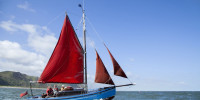
The Cheapest, Smallest Boat to Sail Around the World
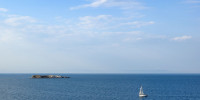
How Big Should a Sailboat Be to Sail Around the World?
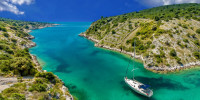
How Long Does it Take to Sail Around the World?
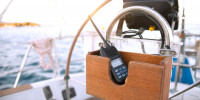
Do You Need a License to Sail Around the World?

Top conditions expected for this week’s GC32 Lagos Cup
The GC32 Racing Tour for the Martin Fischer-designed one design foiling catamaran teams resumes this week in one of the circuit’s favourite venues. Lagos, Portugal, situated 10km away from Cape St Vincent, the southwesternmost tip of Europe, hosted two GC32 Racing Tour events as the world emerged from the pandemic in 2021 and repeated this in 2022. This year it again hosts the GC32 Lagos Cup, which will be the only event for the flying catamarans this season.

Aside from a hiatus during pandemic the GC32 Racing Tour has visited the harbour on Portugal’s Algarve coast every year since 2018, when it attracted backing from the town and region and enjoyed support from the local Lagos Yacht Club and its enthusiastic volunteers, both young and old. The venue is also perfect for the GC32 flying catamaran as it offers the potential for moderate to strong breeze off the Atlantic while also being sheltered by the land. This means that in prevailing northwesterlies, it can offer stiff breeze and flat water – the ideal scenario for racing foiling catamarans at top speed.
This week, the line-up will feature an owner-driver contest between two teams and another high-end battle between a fully pro SailGP team and the defending GC32 World Champions.
From Switzerland, Christian Zuerrer comes into this event having won the GC32 World Championship in 2022 on these waters with his Black Star Sailing Team. While Zuerrer privately owns his team, he is unique in trimming main on board rather than steering. This arrangement he has down to a fine art. For Lagos he has recruited the talents of none other than French ace Franck Cammas to be his helmsman. Alongside his many sailing accolades, such as winning the Volvo Ocean Race and Route du Rhum, Cammas comfortably won the GC32 Racing Tour in both 2016 and 2018 helming Norauto.
“We spent a week together with Franck in May for training and we have been here since Sunday,” says Zuerrer. “It looks good. He is different [to former helm Chris Steele] but in a good way. The training is more demanding but it is good to help us improve our manoeuvres.”
America’s Cup veteran Pier Luigi de Felice will be trimming with Will Alloway on the bow and new recruit, Emirates Team New Zealand’s Guy Endean, in the ‘floater’ position.
“We have been out in 5-25 knots so we have covered it all,” Zuerrer continues. “On Sunday we hit 38.7 knots, with our average around 34-36 knots in about 24-25 knots [of wind].” GC32s have been known to exceed 40 knots but that has usually been on a lake.
Black Star’s principle competition is Team Rockwool Racing, the SailGP team led by Nicolai Sehested. The Danes have spent less time in the GC32, but arrive race fit from the weekend’s Rolex United States Sail Grand Prix in Chicago where they finished a creditable fourth. Unlike Black Star Sailing Team, they will be sailing with the same line-up they had for 2022, which took them to second place behind Alinghi-Red Bull Racing in the opening Lagos event held almost exactly a year ago.
“Our approach has been working,” maintains Sehested. “We are getting to the stage where we put good performances in all the races that we do.” He hasn’t raced his GC32 since last year, but hopes it will be like riding a bike. “We like Lagos – it is warm, it is fun and hopefully we will get good sea breeze – we like the breezy conditions…”
Sehested is looking forward to racing Black Star Sailing Team. “For sure, we would love to have 10 teams here, but at least we can measure ourselves with the World Champions and with Franck Cammas they will push us really hard.”
The owner-driver GC32 bout this week will be between GC32 Class Association President, Australian Simon Delzoppo and the Polish ‘newbies’ of HRM Racing Team, who joined the GC32 Racing Tour in 2022. The Poles are led by Piotr Harasimowicz, CEO and Founder of IT outsourcing company Vector Synergy. A lifelong sailor, Harasimowicz has similar objectives for his campaign as Swiss Foiling Academy had in 2021 – to select, train and introduce selected young Polish dinghy sailors for high-performance sailing competition. To help them with this they have two French aces in double French Laser champion Jean-Baptiste Ducamin and former F18 catamaran champion and Team Engie GC32 crew Benjamin Amiot.
Meanwhile Simon Delzoppo is back in Europe from down under with his .film AUS Racing team. With the exception of trimmer Rhys Mara and James Wierzbowski, his crew is new to him, but all experienced GC32 racers. They include Bruno Mourniac and Thomas le Breton, who both spent countless seasons racing on board Zoulou. “Everyone is super experienced. Zoulou was very similar in how they ran their boat on board. It should settle in pretty quickly,” said Delzoppo. “I am looking forward to a little bit of relaxing sailing!”
Wearing his President’s hat, Delzoppo added: “We are very pleased that the GC32 Racing Tour is back in Lagos. All the teams here are good and looking at the forecast we can expect some great, high speed sailing.”
Tomorrow (Wednesday) is the practice day with racing proper, run by PRO Stuart Childerley with the support of the Lagos Yacht Club, taking place from Thursday to Sunday with up to five races per day.
The GC32 Lagic Cup takes place with the support of local venue partners – City of Lagos, Sopromar, Marina de Lagos, Clube Vela de Lagos, Engel & Völkers, Sonel Hotel, Multirental, Oyster Select, Luzalbashop, AwiWorld and Galp.
Report: James Boyd / Sailing Intelligence
http://www.gc32racingtour.com/
ALSO ON MYSAILING

Valencia 52 SUPER SERIES Royal Cup

The Ocean Race Europe 2025 will finish in stunning Montenegro

Swiss sailors unite behind ambitious new project

America’s Cup E-series Grand Final set to take centre stage in Barcelona

2024-25 Aus Cherub National Champs – Totes for Sale

25 years of Les Voiles de Saint-Tropez

Sassnitz to host Germany’s first-ever SailGP event

Honours even at the Louis Vuitton Cup final in sensational Barcelona conditions

Luna Rossa Prada Pirelli dominate Match Race Final to win the Unicredit Youth America’s Cup

Valencia 52 SUPER SERIES Royal Cup – Day 2

Eyes on the prize as pressure mounts ahead of the Louis Vuitton Cup Final

Intense Battles and Light Winds Define the 2024 Finn NSW Championship
Join Our Newsletter
- Name First Last
- Phone This field is for validation purposes and should be left unchanged.

Read all of the latest sailing news

Dinghy and Yacht Racing News

News from the offshore world

Cruising Stories from around the world

Boats & Gear
The latest boats and yachting gear

Watch everything sailing and boating
Latest Sailing News, Racing, Cruising, Boats, Gear and more

IMAGES
VIDEO
COMMENTS
Founded in 1932, the Lagos Yacht Club (LYC) is located on one of the best properties in Lagos, just across Independence Bridge leading to Victoria Island, and it is famous for its picturesque views and beautiful breeze. From here you can watch the ships sail in and out of the harbour, follow as our Club yachts race or better yet learn how to ...
January 24, 2022. …How Lagos Yatch Club Has Survived For 90 Years. …Why Many Nigerians Shy Away from Sailing. This year, the legendary Lagos Yatch Club, will be 90 years old. In an exclusive interview with Transport Day, the Commodore of the club, John Shidiak, spoke on its activities over the years and projections for the year amongst ...
The Lagos Yacht Club (LYC) is one of the oldest sporting club in Nigeria. The yacht club was founded in 1932. It is located south of Tafawa Balewa Square and the National Museum; all in Lagos Island, across the bridge leading to Victoria Island. [1]
Founded in 1932, Lagos Yacht Club (LYC) is located in one of the best property in Lagos Island, just across the bridge leading to Victoria Island, making the view from LYC picturesque. You can watch the ships sail to and from the harbor, watch the Yacht Club races or even be a part of one.
National Championships for each of the four main classes of boats namely Hobie 16, Lightning, Tarpon and Laser is held on an annual basis with the winner qualifying to represent Nigeria at the World Championships. Come discover the joy of sailing at LYC!
The Lagos Yacht Club, located at Magazine Point, near the Army Officers’ Mess on the beautiful Island of Lagos in Nigeria, was founded in 1932. The Club is located right across Independence Bridge leading to Victoria Island.
Following on from mid-June's GC32 Lagos Cup, the GC32 World Championship, annual highlight of the GC32 Racing Tour and the only official World Sailing-endorsed championship for foiling catamaran 'yachts', will take place over 13-17 July in Lagos, Portugal.
Lagos, Portugal, situated 10km away from Cape St Vincent, the southwesternmost tip of Europe, hosted two GC32 Racing Tour events as the world emerged from the pandemic in 2021 and repeated this in 2022. This year it again hosts the GC32 Lagos Cup, which will be the only event for the flying catamarans this season.
What do you need to sail around the world? You will need a route, a bluewater sailboat, enough money, time, the necessary paperwork, and equipment (i.e. water maker, electricity generator, satellite phone, power-free autopilot).
Lagos, Portugal, situated 10km away from Cape St Vincent, the southwesternmost tip of Europe, hosted two GC32 Racing Tour events as the world emerged from the pandemic in 2021 and repeated this in 2022. This year it again hosts the GC32 Lagos Cup, which will be the only event for the flying catamarans this season.